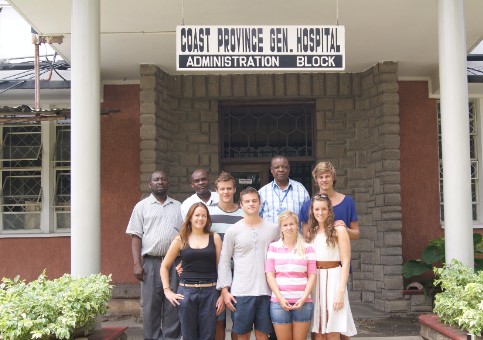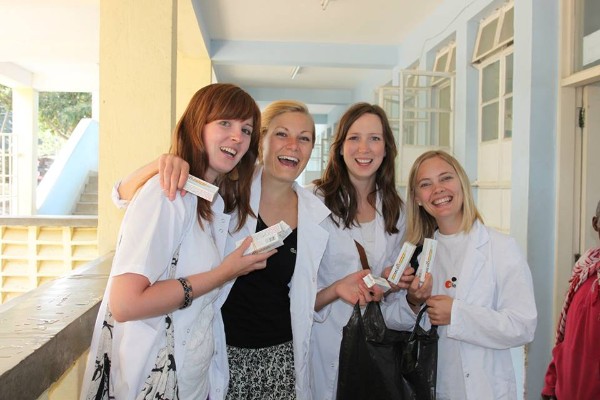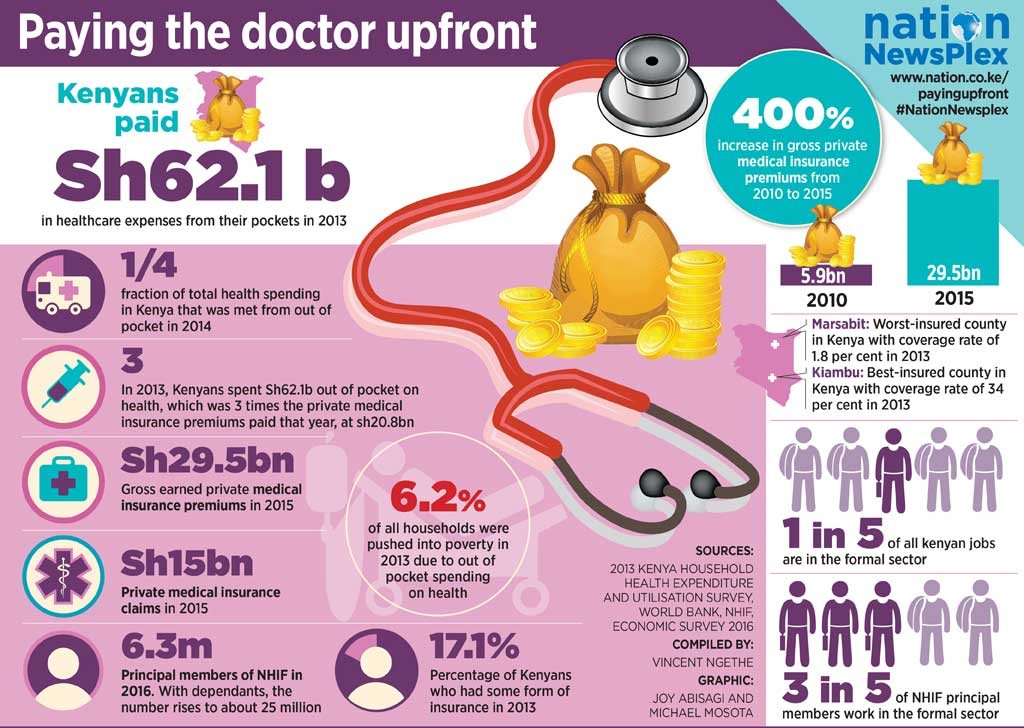 Visit Elective Africa website Visit Elective Africa website
|


|
|
|
| Summer Clock Is Ticking! |
|
Welcome to our July Newsletter. At Elective Africa things are getting better and spicier. We cannot wait to tell you what is in our July Newsletter. In this Issue:
|
| The Summer Pre-Health Shadowing |
|
While now is the time to catch up on sleep, hang by the pool, and binge watch your favorite show on Netflix, summer is also the time to gain valuable experiences and exposure to the field of your interest. Our pre-health programs have a new perspective added to them to ensure that the best experience is what you get. This includes: Filling in of daily logs To ensure that at a personal level you keep track of your experience alongside your intended objectives, we introduced a new activity; Healthcare Internships Daily Log. As we continued to receive many inquiries from pre-health students looking to shadow abroad, we moved a step further to ensure that our participants have a record to capture their daily experience that they can then present back to their school for credit consideration. The Program Manager will discuss these daily achievements so as to enhance your hospital experience daily. Mentoring For our students to gain value in our pre-health shadowing programs, we ensure that their placement have a mentor at the hospital. This will be the go to person at your hospital of placement, the person that ensures you will be guided to learn and actually understand the things you see and experience during the different rotations. Local Excursions The value of adventure can never be underestimated in a new destination for you. Irrespective of your desired area of study or your area of shadowing its key to be immersed in fun activities that make your stay away interesting. We ensure that your afternoon is activity laden from visit to animal orphanages to the recreation sites you are sure to have the best off hospital experience. Talking about it>>> “ I chose Elective Africa because it was something I had never experienced before. I was a little bit nervous because it was my first time in Africa and Kenya alone. The program representatives were very supportive to me and assisted me no only settle down in a home away but also became part of family for me guiding me through my stay at all times. I enjoyed my time at Mbagathi District Hospital in the dental department. It was very interesting to see a public hospital setting in a developing world for the first time. I enjoyed this experience because I was able to observe conditions that are normally not seen back in the states. I was also able to assist the medical professionals such as dentists during root canal and dental scaling procedures. Overall the program allowed me to experience Kenya and my internship to the fullest I would recommend this program to others who wish to have an outstanding experience in Africa.” Faith Han – Buffalo University Back to top |
| Your Placement Destination: Mombasa |
 |
|
Mombasa: city of salt and of spice, of dreams and of battles, of poetry, of seafaring stories and of wave upon wave of traders from faraway lands. 'It does not reveal the great secret it holds,' wrote the classical Swahili poet Muyaka about his hometown. Mombasa is a top coastal tourist destination of choice that lies on the Eastern coastline of the Indian Ocean. The city is famed for its vibrant Swahili culture, good economy hotels, delicious exotic sea foods and idyllic beaches. It is at this destination that we offer a meaningful and structured hospital volunteer: healthcare placements and pre-health shadowing programs, with quality hands on experience, clinical exposure and opportunity to gain valuable insight into global health. Placement in Mombasa Kenya will provide you with a rare opportunity to experience a new and diverse healthcare setting. We have partnerships with three (3) hospitals; Coast Provincial General Hospital (GPGH), Bomu Medical Hospital and Port Reitz District Hospital, different hospitals. In our newsletter today, we will enlighten on Coast Provincial General Hospital. Coast General Provincial Hospital CPGH is the second largest government hospital in Kenya and serves as the tertiary referral and training center for the entire coast region. The hospital has 700 beds capacity and serves a primary population of one million people and a secondary population of around three million people. It also has a gender based violence centre within it. The placements at the hospital are customized to fit each individual’s interests and level of education. Depending on the department, the day normally begins at around 8:30 a.m. with updating on the status of the current patients. After which, the ward rounds begin. During the ward rounds, the students get to know more about the diseases such as malaria and typhoid as the doctors’ reviews and discuss on the patients’ progress. After the ward rounds it is mostly participating other key departmental specific activities. Clinical experience at the hospital is extensive and intensive and varies depending on the departments that you will be at. The following are the major departments that most of our students like to do their electives at:
The department is normally busy and it operates 24/7. It is at this department that patients are first brought into. Your day in this department normally begins at 8:00 a.m. with lots of hospital activities to shadow or to do under close supervision. The activities that you will get to do are: suturing, cleaning wounds, draining abscess, catheter insertion, IV insertion and casualty ward rounds.
At obstetrics and gynecology, the mornings begin with the meetings for updating on the types births of the previous day. Afterwards, the labor ward rounds are done. You will get to learn a lot during this session as the patients’ reviews are done. Other activities that you may be involved in under close supervision are delivering of babies, C-sections, resuscitation of babies and surgical of procedures like the removal of fibroids.
The day normally begins with updating on the status of the current patients and then the ward rounds in the male and female wards where you will take part in the patients’ review. You will also get to diagnose and treat infectious diseases under close supervision and learn about drug prescriptions for certain diseases; mostly tropical diseases. Out of the hospital, there are lots of activities to engage in and so many interesting places to visit. The culture of the coastal community is rich and diverse and you could be involved in it by learning their history, enjoying their local delicacies and dancing to the taraab.
Bryanne Robson is one of our Alumni from Drexel University College of Medicine - Philadelphia. He enrolled to the program first as a medical student, satisfied about the hands on and unique experience she enrolled back to the program as a New Doctor. In more than one encounter the experience met and exceeded her expectations and she had some well crafted words to summarize her experience:
"I came to the EA program in hopes of getting more hands-on time in an operating room. I actually got an experience that was a million times better than just OR time. We first assisted in many c-sections and got incredible teaching in the Millenium Theare from some amazing obstetricians. We split our time between OB and ER/Minor Theatre. There were many days when we were the medical staff in the minor theatre - performing minor surgeries and suturing wounds under our own direction. The autonomy was an incredible learning experience that just isn't as prevalent in the US anymore - due to all the hand-holding during training. We learned how to make the most of the resources provided and how to work in less than pristine and perfect conditions. I can say for a fact that this adventure has forever changed me and my future practice as a (future) Family Physician. Every speciality in the Coast Provincial General Hospital opened their wards to us - in hopes of teaching and sharing medical practices between the US and Kenya. We learned from everyone and were treated as equals. Everyone was encouraging and appreciative of us. Aside from medicine, Kenya was amazing. We were welcomed by Phares and the staff at the Mombasa Compound with welcome arms. It was an instant home filled with family. We took awesome trips to the Masai Mara Game Reserve and to Malinidi. We learned a ton in the hospital and then had just as much fun exploring Kenya. One of the experiences that has changed my life, was a trip to the orphanage at St. Patience's school. Bringing smiles to the little children's faces brought a feeling of personal reward that is indescribable. I hope to return to CPGH in Mombasa as a resident, and later when I'm in my own practice. THANK YOU!" Back to top |
| FIVE Key Habits For Survival in Medical School |
 |
|
What skills do students need in order to do well in medical school, particularly during the basic sciences part of the program? This is a question that prospective and current students may ask as they ponder whether they have what it takes to succeed on the arduous journey to becoming a physician. From our interaction with students from various destinations and places we have sampled out some of the key things that successful students should give attention to in order to emerge victors. Here are a few of them: Habit 1: Learn how you learn Medical school requires long working hours with a great enormity of knowledge that one needs to master and this can be overwhelming. It is therefore a critical tool that one gets to understand how they can learn best and most effectively. Whether it is by taking copious notes in class, drawing pictures of dissections, listening to the lectures later in your phone or joining study groups. The field of medicine is one that is full of lifelong learning, you will constantly need to update your knowledge of the field by reading journalism attending conferences and discussing interesting cases with your colleagues. The understanding of how best you deliver and learn is a lifelong benefit that you will live to reap from. Habit 2 Look beyond your books Sticking around your books 24/7 will make you miss on a lot that the medical school has to offer. It is key that you join clubs join clubs, get involved in student government and sign up for a committee. Contributing in activities that this groups have to offer will help you contribute to the culture of your medical school and make it a more enriching place for other medical students. By being involved you will learn how to network and establish connections that will serve you throughout your career. Habit 3: Give back A big chunk of pre-med life is spent scurrying amongst volunteer experiences in an attempt to become a better applicant. Medical school provides you with lots of opportunities. You have a chance to contribute to the community, make connections and develop new skills which may go through to your residency application. The art of volunteering especially to disadvantaged communities and health systems may come in to help you accrue essential skills to ensure your own personal development. Habit 4: Be adventurous both professionally and personally What you may not realize at the beginning of medical school is how quickly the time goes by and how soon you will need to be making a decision about your specialty. The summer period between your first and second year is a great opportunity to have an abroad experience through medical electives oversees. If this has already passed for you then it would be of great importance to find out a way to be engaged through senior medical electives for a rewarding experience, greater hands on experience for a clear understanding of what it is like to be in the specialty you want to be in. Habit 5: Establish a circle of mentors Most medical schools have formal mentoring programs connecting students with faculty or senior medical students with junior medical students. Other medical students can provide you with invaluable advice on issues that they dealt with recently ranging from how to study for tests or even how to survive surgery. Faculty members on the other hand help to provide perspective, they have seen many students go through the ups and downs of medical school and can give a broader view, or at least assure you that your feeling is not unique to yourself only. There is great value in learning how to cope with medical school and even more value to studying abroad, experiencing a different health system and studying abroad. For medical electives abroad and oversees hospital volunteer experience Elective Africa is your ideal companion. Back to top |
| Struggling to Thrive: How Kenya's Low Income Families(try to) Pay for Health Care |
 |
|
Isaac and Monicah one of the 298 families participating in the Kenya Financial Diaries study, at the beginning of the study, Monicah had just delivered her third baby, and she was suffering from an illness that made it hard for her to keep food down. She went to her local public dispensary, to clinics, and to the public referral hospital on numerous occasions, each of which sent her away, saying nothing was wrong. After exhausting their own funds to finance her care, the family started getting help from relatives and friends to pay for more tests and more hospital admissions. Isaac sold an important money-making asset – a rental house – to get extra money for Monicah’s care. Meanwhile, she kept getting sicker and sicker. The hospital would insist on admitting her, but each time she would have to wait until they could pull together the funds. Eventually, after months of missed opportunities, the doctors told her she had a tumour in her throat, requiring surgery that would cost KSh23,000. They had no way to come up with the funds, and Monicah soon died. Funds from friends and family came gushing in to cater for the funeral expenses. Isaac was bitter. Where were those funds when they could have saved her life? Unable to care for his children while working as a fisherman, Isaac sent them to stay with different relatives. He was not only broke, but depressed, alone, and was himself sick; exhibiting symptoms of tuberculosis, and in addressing his own illness, he experienced another set of inconclusive and unhelpful interactions with medical facilities. Isaac found himself sleeping on the street, sometimes bunking up with friends while he tried to get back on his feet and into a position where he might rent a home for himself and his children. So, many things had gone wrong. A quick, correct diagnosis would have meant far lower medical expenses, and Monicah might have received treatment while the tumour was still at an early stage. If the social network had been responsive when Monicah needed surgery, the treatment might have saved her life and kept the mother of three small children around to care for them for many years ahead. The sale of the rental house compounded Isaac’s poverty and made the wake of Monica’s death more difficult for the entire family. At the same time, had the hospital provided surgery to every patient like Monicah, without assurance of compensation, it wouldn’t be able to cover its costs and sustain its operations. This is an excerpt from Financial Sector Deepening (FSD) Kenya (2016), Struggling to Thrive: How Kenya’s Low Income Families (try to) pay for Health Care. Isaac’s story is not different from other Kenyan families facing the same challenges in buying health care. Despite the enactment of a policy that abolished user fees for all services at government owned health centers and dispensaries that offer primary care as well as user fee for maternal services at all government facilities in 2013, direct and indirect costs of healthcare still remain a big challenge and adversely affecting better health for Kenyan’s low-income groups. Primary Care Facilities in public sector where user fee has been scrapped off accounts for only 40% of outpatient visits (Kenya Household Health Expenditure and Utilization Survey(KHHEUS), 2013). The remaining outpatient services being accessed at public and private facilities still entail user charges. The report also indicated that only a fifth of Kenyans have insurance to settle costs of hospitalization. The rest have to pay for these services out of their own pockets. For people like Isaac who may not be able to afford, are left hopeless as they watch their loved ones die. So, the question is, Is Kenya moving towards achieving Universal Health Coverage? Yes, it is, but there is plenty to be done to realize this goal. The government and relevant stakeholders need to come up with a reform that will monitor, regulate and enforce quality in health facilities both private and public. When the low income Kenyans may not be able to afford for insurance premiums, the government can have the Out of the pocket cost that they pay for healthcare minimized as possible to help families like Isaac’s. The rising cost of healthcare makes it hard for majority of populations fail to acess primary heathcare hence the presenation of cases at advanced stages. In a placement with us you will learn and experience cases in their advanced stages and hence a great learning opportunity. Back to top |
|
|

 7 2016
7 2016